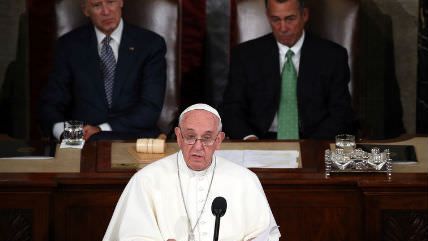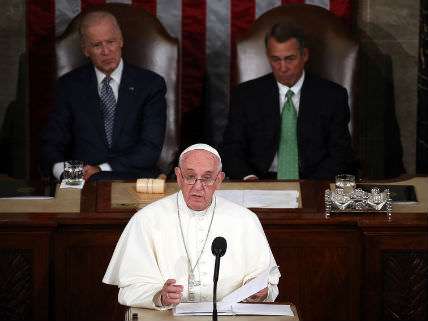Pope Francis Says World Increasingly a Place of Violent Conflict—Not Quite
Taking for granted an improving world risks the improvements.


In his address to the U.S. Congress, the first by a pontiff in American history, Pope Francis talked about the "disturbing social and political situation of the world today," calling it "increasingly a place of violent conflict, hatred and brutal atrocities, committed even in the name of God and of religion."
Francis continued by cautioning against a "simplistic reductionism which sees only good or evil," saying a "delicate balance… [was] required to combat violence perpetrated in the name of a religion, an ideology or an economic system, while also safeguarding religious freedom, intellectual freedom, and individual freedoms."
That's an important message—the fervor whipped up over a perceived battled of "good vs. evil" has fueled a 14-year-and-running U.S. war on terror that has spanned the globe, included two land wars, massive surveillance, extrajudicial killings, detentions, and numerous air bombing (drone and otherwise) campaigns. It's contributed to the destabilized environment in which Osama bin Laden's "core Al-Qaeda" has made the way for even more violent groups like the Islamic State in Iraq and Syria (ISIS), Boko Haram, and Al-Shabaab. The response to the terrorist acts of September 11, 2001 compounded the tragedy, extending it over a generation and a globe.
But it's not just the simplistic reductionism of good and evil that leads to policies, even in democratic societies, that contribute to violent conflict. So does a misunderstanding or misrepresentation of, or overreaction to social and political conditions today. The world, for example, despite the pope's assertions, is not getting increasingly violent. It's becoming less so. The first decade of this century saw less deaths from violent conflict than any decade of the 20th century—this while the world population nearly quadrupled. As the Small Arms Survey noted, a "small number of countries accounts overwhelmingly for the global toll of conflict deaths," suggesting "carefully targeted armed violence reduction" would have the biggest effect, the opposite of the kind of solution the premise that the world is getting "increasingly violent" drives many people to.
We know this because we saw it unfold after 9/11, when many Americans were convinced the world was falling apart around them. The policies those fearful convictions led to made the fears a bit of a self-fulfilling prophecy. The delicate balance between fighting authoritarian violence without and not being consumed by it within is easier to maintain when today's violence is kept in the context of the enormous reductions in armed conflict, and enormous increases in economic prosperity, around the world in the last hundred years. Things are getting better, and will get better still. Taking for granted that they are makes it easier to support policies that could reverse the unprecedented improvements in the social and political situation of the world today.


Show Comments (123)